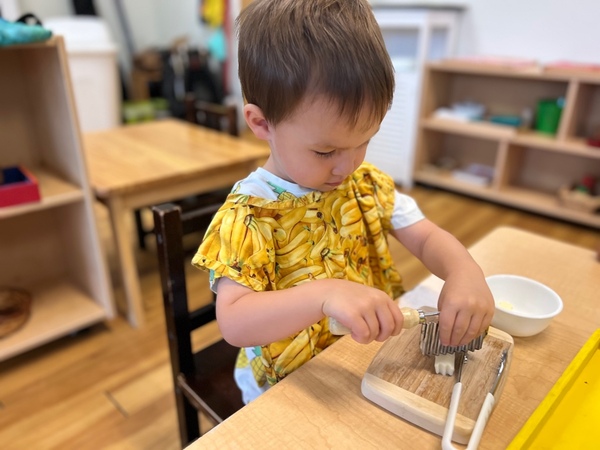(858) 759-0631
It's a good time for us to keep reminding ourselves what we are thankful for, focusing on what we are fortunate to have. We can apply that when we look at our children. Each child is unique and special. Even though we look at the milestones for the age group, we focus on the individual's development. Let us think about how much your child is talking (able to express their needs in words), how much physical independence he/she has, and about their self-confidence. 'Respect' is vital to parenting, but the word can confuse us, especially when it comes to setting limits with toddlers. Winter break is around the corner, and many of us will be heading out on vacation or visiting family nearby or in distance.
Here are a few tips on how to deal with our toddlers to avoid any difficulties and unhappy moods they can bring us if we give in:
- Children need lots of opportunities to be autonomous and have their choices respected. At the same time, they also need to know if they are not in charge, and that we demonstrate our confident, decisive, gentle leadership. It can be tricky figuring out how to balance these seemingly opposing needs. How do we know when our children should choose and when they need us to?
- If our toddlers could let us know when we are giving them too much freedom and causing them to feel uncomfortable powerful they probably wouldn't...at least, not verbally. But these uneasy feelings are usually expressed through their behavior as they become resistant, whiny, distracted, or clingy. Sometimes they will continue to test until we choose for them.
- It might seem ironic and unfair that giving our children freedom to choose can cause them to test our boundaries even more, but there we are.
- Two-year-olds aren't terrible - they're torn. As much as they appear to want to be in charge, the reality of that power is frightening to them and it can severely undermine their sense of security.
- Most of the choices toddlers can't comfortably make are about transitions. This makes sense because toddlers are already in the middle of a massive transition, growing and changing at a dizzying pace. Even the most minor transition means giving up the temporary balance they've managed to attain and finding their footing in a new situation. And when we give toddlers more than one brief choice during times of transition, we invite them to dig their heels in.
Here's an example of Setting Limits With Toddlers – The Choices They Can’t Maken from Janet Lansbury where she explains:
Your two-year-old has been invited to a party and suddenly, mysteriously puts on the brakes as you approach the host's door. "No want to!" he whines. You're thrown, or perhaps you've begun to expect this kind of behavior. "Well, what's the hurry?" you say to yourself. "After all, we're only here for my boy to have a good time. I don't want him to be upset."
So you wait with your child while he wanders around the front yard. You wait, wait and wait some more for your child to tell you he's ready. You certainly don't want to enter your friend's house carrying a screaming child. And this should be his choice, right? But because you are human, you're losing patience and getting annoyed (which is usually a sign that you need to set a limit). You try coaxing him with delectable descriptions of balloons, games, and yummy cake, all of which you know he adores. Still, he refuses.
Should you...
a. Keep waiting, coaxing, and getting more annoyed
b. Go back home
c. Let him know it's time to go in, carry him inside, and face his possibly explosive negative reaction.
d. Give him the choice of going in now or in three minutes (or perhaps the choice of walking or being carried) and then follow through with it.As you might have guessed, I recommend option "d." Once you're inside I'd allow the child to choose to stay on your lap for as long as he wishes or participate in the party and be prepared to possibly repeat option d. when it's time to leave (the joy!).
When we project a feeling of calmness, our children usually release their upset feelings quickly and feel free to move on. Good luck to you all.
–Cricket Teacher

